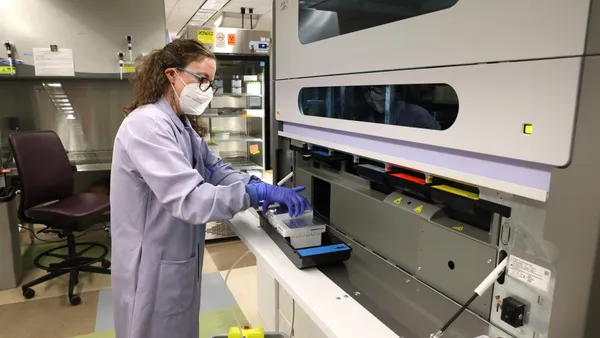Invitae has hired restructuring advisers as it explores strategic options, including a potential bankruptcy filing, the Wall Street Journal reported Monday, citing unnamed sources familiar with the matter.
The genetic testing company could file for bankruptcy within weeks, according to the Journal report.
Invitae is working to strengthen its balance sheet, and its board of directors formed a special committee focused on improving the company's capital structure, a spokesperson told MedTech Dive on Tuesday, reiterating what the company disclosed in its third-quarter earnings release. The company is exploring options that include raising capital, selling assets, refocusing business and R&D efforts, reducing expenses, and addressing its debt obligations.
The Invitae spokesperson declined to comment specifically on the Journal report and "market rumors and speculation."
On Tuesday, the company said in a filing with the U.S. Securities and Exchange Commission that the New York Stock Exchange would begin the process of delisting its stock and immediately suspend trading. On Monday, the final day of trading, Invitae's stock price declined by over 77% to just 9 cents per share. The stock closed at $57.40 on Dec. 10, 2020.
In January, Invitae sold its reproductive health assets to Natera for $10 million upfront and up to $42.5 million in milestone payments and litigation credits.
According to the Journal article, Invitae is working with investment bank Moelis and FTI Consulting to explore strategic options, including bankruptcy, to address $1.5 billion in debt on its balance sheet.
An FTI Consulting spokesperson told MedTech Dive that the company does not comment on reports of client engagements as a matter of policy.
A Moelis spokesperson did not respond to a request for comment.
Invitae had $254.6 million in cash, equivalents and securities as of Sept. 30, 2023, compared to $547.1 million on Dec. 31, 2022, according to the company’s third-quarter report. In the filing, it said it expected to incur additional operating losses and negative cash flows in the near term.











